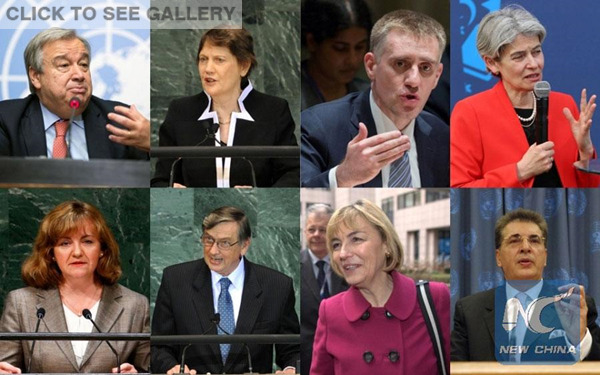As the second-day hearings for candidates running for next UN chief concluded Wednesday, the question on promoting gender equality within the UN system was presented time and again, both to female and male candidates.
If being elected as the UN secretary-general, what are the steps you would take to improve gender balance within the UN's most senior management levels? -- this is a question being raised to the candidates by the Group of Friends in Favor of a Woman for Secretary-General of the United Nations.
The group is initiated by Colombia and made up of dozens of member states.
Responding to that question, one of the candidates Danilo Turk, former president of Slovenia, said it is in the spirit of his belief that the ideal team should basically be fifty to fifty regarding the number of men and women.
Vesna Pusic, a female candidate and former Croatian foreign minister, said it is extremely important to look for the people of "best quality" within the UN system, and if the organization looks for "first-class" women, "there will be more than 50 percent."
Another woman candidate at Wednesday's hearing podium, Natalia Gherman, a Moldovan politician, said women should be given the opportunity to contribute to the UN; and if she can be elected as the UN chief, she would prioritize the task of putting qualified women on important positions within the system.
Improving gender equality has been one of the highlights in the UN's first-ever audition for candidates campaigning to become the UN's next secretary-general after the current Secretary-General Ban Ki-moon's term ends at the end of 2016.
Other questions on this matter like how to involve women in mediations as well as in peace negotiations have also been put into discussions for the past two days.
Irina Bokova, who is considered to be a strong female contender, stressed Tuesday that it is impossible to achieve peace or sustainable development without gender equality.
"I think that the 21st century has to be the century of a true commitment to equality between the sexes and to provide women with the opportunity to develop as equal members in their society," she said.
Ever since the United Nations began soliciting candidates and setting in motion the process of selecting the next UN secretary-general, there has been a strong call from the civil society as well as some UN member states to select a woman as the world's top civil servant.
In the 70-year history of the United Nations, there have been eight male secretaries-general. A woman has never held the top position.
In light of calls for a female secretary-general, "member states are encouraged to consider presenting women, as well as men, as candidates for the position," said a joint letter by UN General Assembly President Mogens Lykketoft and Samantha Power, the U.S. ambassador to the United Nations who served as Security Council president for December 2015.
Among the nine candidates declared so far, four of them are women. Besides the three female candidates mentioned above, Administrator of UN Development Program Helen Clark, also former prime minister of New Zealand, is scheduled to present herself to the General Assembly Thursday morning.



















































